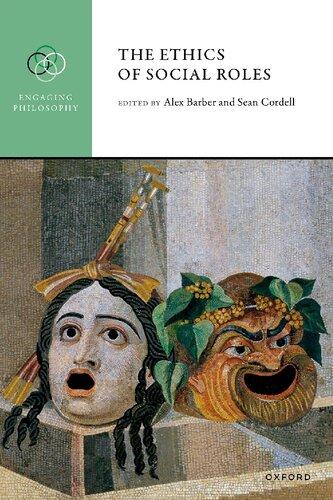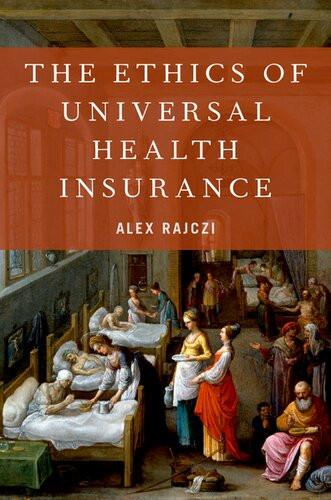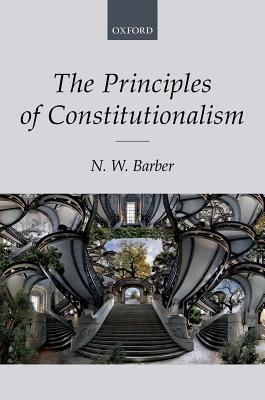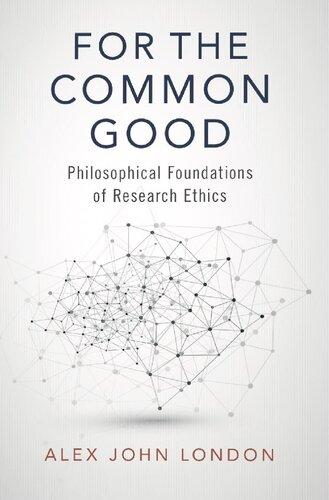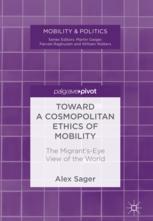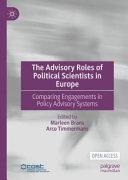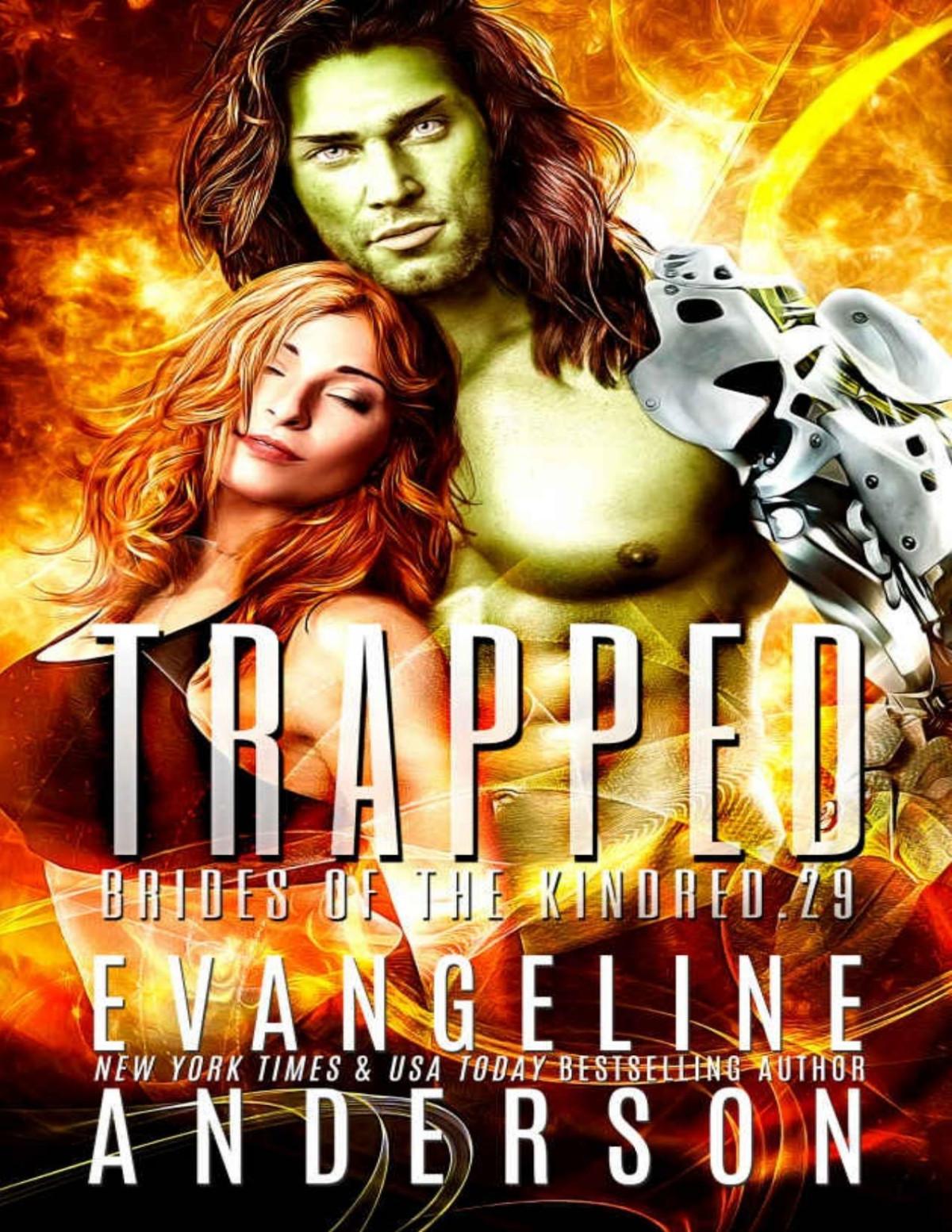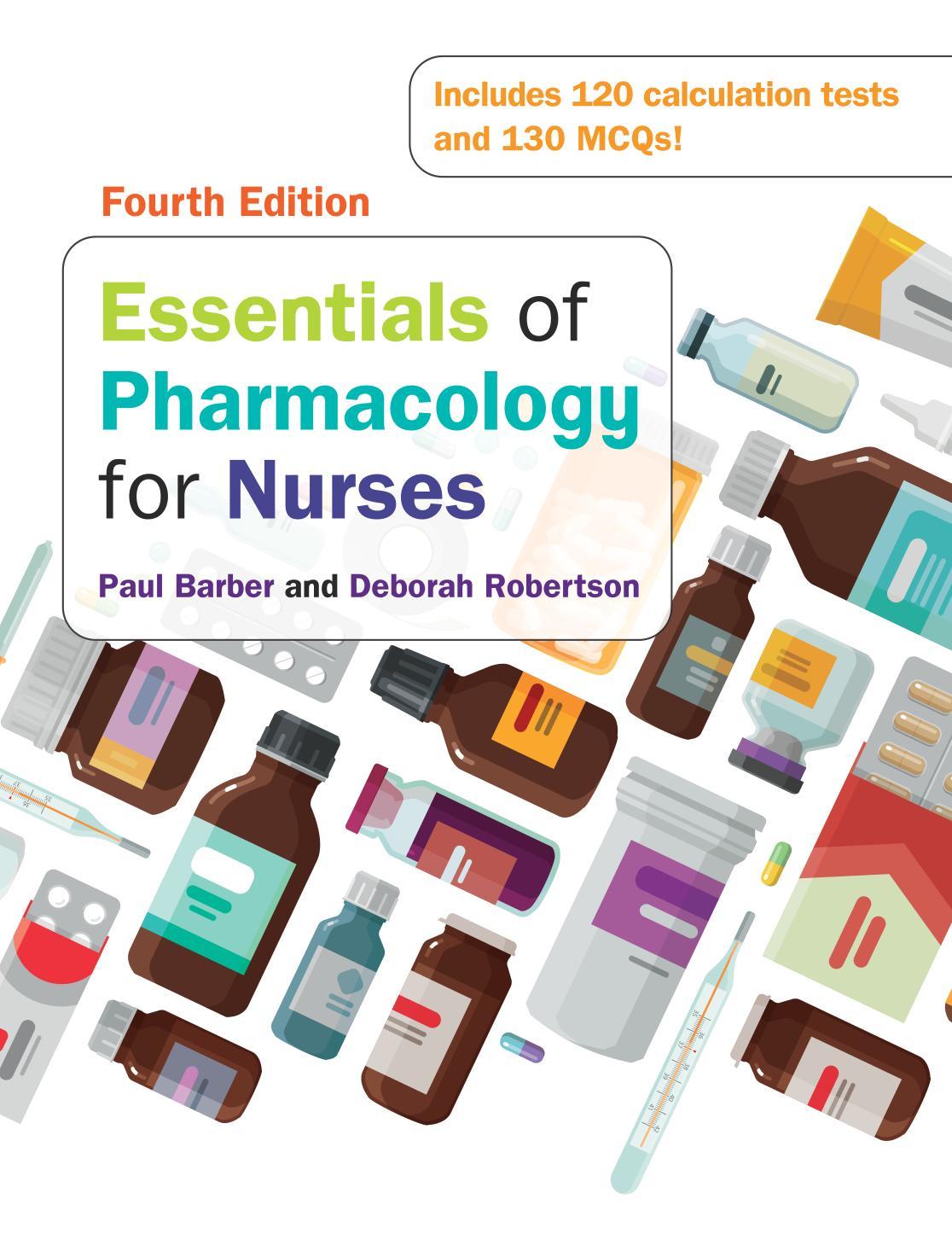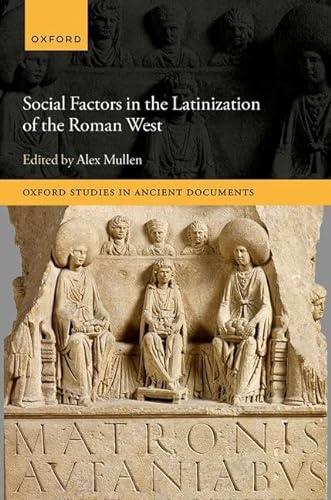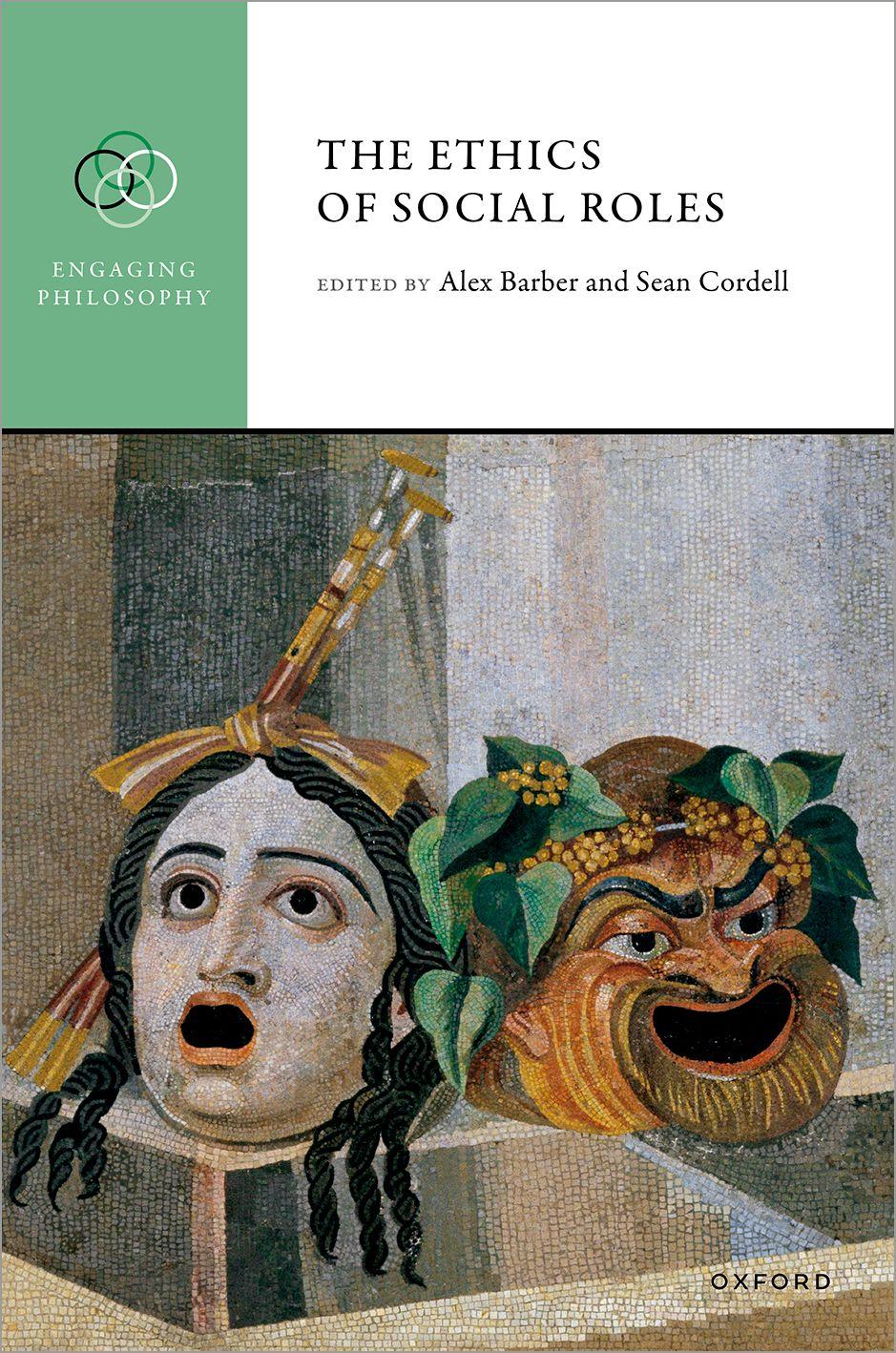The Ethics of Social Roles Alex Barber (Editor) Visit to download the full and correct content document: https://ebookmass.com/product/the-ethics-of-social-roles-alex-barber-editor/
More products digital (pdf, epub, mobi) instant download maybe you interests ...
The Ethics of Universal Health Insurance Alex Rajczi
https://ebookmass.com/product/the-ethics-of-universal-healthinsurance-alex-rajczi/
The Principles of Constitutionalism N W Barber
https://ebookmass.com/product/the-principles-ofconstitutionalism-n-w-barber/
Out Of Her Depth Lizzy Barber
https://ebookmass.com/product/out-of-her-depth-lizzy-barber/
For The Common Good: Philosophical Foundations Of Research Ethics 1st Edition Alex John London
https://ebookmass.com/product/for-the-common-good-philosophicalfoundations-of-research-ethics-1st-edition-alex-john-london/
Toward a Cosmopolitan Ethics of Mobility: The Migrant's-Eye View of the World 1st Edition Alex Sager (Auth.)
https://ebookmass.com/product/toward-a-cosmopolitan-ethics-ofmobility-the-migrants-eye-view-of-the-world-1st-edition-alexsager-auth/
The Advisory Roles of Political Scientists in Europe
Marleen
Brans
https://ebookmass.com/product/the-advisory-roles-of-politicalscientists-in-europe-marleen-brans/
Trapped: Brides of
the Kindred Book 29 Faith Anderson https://ebookmass.com/product/trapped-brides-of-the-kindredbook-29-faith-anderson/
Essentials of Pharmacology for Nurses 4th Edition Paul
Barber
https://ebookmass.com/product/essentials-of-pharmacology-fornurses-4th-edition-paul-barber/
Social Factors in the Latinization of the Roman West (Oxford Studies in Ancient Documents) Alex Mullen (Ed)
https://ebookmass.com/product/social-factors-in-the-latinizationof-the-roman-west-oxford-studies-in-ancient-documents-alexmullen-ed/
TheEthicsofSocialRoles ENGAGINGPHILOSOPHY Thisseriesisanewforumforcollectivephilosophicalengagementwith controversialissuesincontemporarysociety.
DisabilityinPractice
Attitudes,Policies,andRelationships
EditedbyAdamCuretonandThomasE.Hill,Jr. Taxation
PhilosophicalPerspectives
EditedbyMartinO’NeillandShepleyOrr BadWords
PhilosophicalPerspectivesonSlurs
EditedbyDavidSosa
AcademicFreedom
EditedbyJenniferLackey Lying
Language,Knowledge,Ethics,andPolitics
EditedbyEliotMichaelsonandAndreasStokke
TreatmentforCrime
PhilosophicalEssaysonNeurointerventionsinCriminalJustice
EditedbyDavidBirksandThomasDouglas Games,Sports,andPlay PhilosophicalEssays
EditedbyThomasHurka
EffectiveAltruism PhilosophicalIssues
EditedbyHilaryGreavesandTheronPummer PhilosophyandClimateChange
EditedbyMarkBudolfson,TristramMcPherson,andDavidPlunkett
AppliedEpistemology
EditedbyJenniferLackey
TheEpistemologyofFakeNews
EditedbySvenBernecker,AmyK.Flowerree,andThomasGrundmann
TheEthicsofSocialRoles Editedby ALEXBARBERANDSEANCORDELL
GreatClarendonStreet,Oxford,OX26DP, UnitedKingdom
OxfordUniversityPressisadepartmentoftheUniversityofOxford. ItfurtherstheUniversity’sobjectiveofexcellenceinresearch,scholarship, andeducationbypublishingworldwide.Oxfordisaregisteredtrademarkof OxfordUniversityPressintheUKandincertainothercountries ©theseveralcontributors2023
Themoralrightsoftheauthorshavebeenasserted FirstEditionpublishedin2023
Allrightsreserved.Nopartofthispublicationmaybereproduced,storedin aretrievalsystem,ortransmitted,inanyformorbyanymeans,withoutthe priorpermissioninwritingofOxfordUniversityPress,orasexpresslypermitted bylaw,bylicenceorundertermsagreedwiththeappropriatereprographics rightsorganization.Enquiriesconcerningreproductionoutsidethescopeofthe aboveshouldbesenttotheRightsDepartment,OxfordUniversityPress,atthe addressabove
Youmustnotcirculatethisworkinanyotherform andyoumustimposethissameconditiononanyacquirer
PublishedintheUnitedStatesofAmericabyOxfordUniversityPress 198MadisonAvenue,NewYork,NY10016,UnitedStatesofAmerica
BritishLibraryCataloguinginPublicationData Dataavailable
LibraryofCongressControlNumber:2022947950
ISBN978–0–19–284356–2
DOI:10.1093/oso/9780192843562.001.0001
Printedandboundby CPIGroup(UK)Ltd,Croydon,CR04YY
LinkstothirdpartywebsitesareprovidedbyOxfordingoodfaithand forinformationonly.Oxforddisclaimsanyresponsibilityforthematerials containedinanythirdpartywebsitereferencedinthiswork.
Preface vii
Acknowledgements ix
ListofContributors xi
AbstractsofChapters xiii
1.AnOverviewofSocialRolesandTheirEthics 1 AlexBarberandSeanCordell
PARTONE:HISTORICALFOUNDATIONS 2.TemptedLikeAchilles:ReflectionsonRolesandRole-Recalcitrance inAncientandModernEthics 25 SophieGraceChappell
3.RolesandVirtues:WhichisMoreImportantfor ConfucianWomen? 49 JingIrisHu
4.JohnDewey’sAnalysisofMoralAgencyasPragmatistRoleEthics66 JohnSimons
5.AGoodDoctorbutaBadPerson?APuzzleforRoleEthics fromLøgstrup 87 RobertStern
PARTTWO:THENATUREAND NORMATIVITYOFROLES
6.AllTogetherNow:WhenIsaRoleObligationMorallyBinding?107 ErinTaylor
7.ThePartWePlay:SocialGroupMembershipasaRole 133 TracyIsaacs
8.ExplainingRole-BasedReasons 156 ReidBlackman
PARTTHREE:ROLES,INSTITUTIONS, ANDORGANIZATIONS
9.RoleEthicsandInstitutionalFunctions177 SeanCordell
10.RoleObligationstoAlterRoleObligations200 StephanieCollins
11.AreObligationsofFriendshipRoleObligations?217 DianeJeske
12.MyJobandItsRequirements236 ThomasH.Smith
PARTFOUR:WELLBEING,SELFHOOD, ANDROLES 13.ThreeRelationsBetweenRolesandtheGood263 SamuelClark
14.ParticipatoryWellbeingandRoles278 AlexBarber
15.VirtuousChameleons:SocialRoles,Integrity,andtheValueof Compartmentalization 298 LukeBrunning
Preface Manyofthemostsignificantpracticaldeliberationswemaketurnonsomesocial roleorotherwehappentooccupyatthetime(where ‘socialrole’ isreadwidelyto includeprofessionalrolessuchas teacher or manager aswellas parent, carer, friend, citizen,etc.).Membersoftheemergencyservicesoftenputthemselvesin harm’sway,runningtowardsadangerzoneinsteadofawayfromitlikeeveryone else.Theyareadmiredfordoingso,butatthesametimethisissomethingthey,as firefightersorpoliceofficers,are meant tobedoing.Morallyloadeddecision makingoftenrequiresustoreasonandactwithaparticularhaton,sotospeak. Sometimeswemust firstdecide which hattowear(ofcolleague,offriend,of manager)orwhethertowearahatatall.
Despitethesebeingfeaturesofdailyexperience,theethicalsignificanceofrole occupancyhaslonggoneunder-acknowledgedasatopicwithinnormativeethics. Tobemoreaccurate,whilecertainsocialroles(includinglegal,medical,business, military,gender,family,andfriendshiproles)havebeenrecognizedasethically significant,theirsignificancehasbeenaddressedpiecemeal.Wecurrentlylacka developedliteratureontheethicalsignificanceofsocialrolesassuch onwhat theyare,onwhytheyappeartohaveethicalforce,onthestructureofthatforce, andonthesignificanceofsocialrolesforidentityandwellbeing.
Thecontributorstothisvolumehavesetoutto fixthis,buildingonthesmall bodyofworkthatdoesalreadyexistandextendingitintonewandunexpected areas,bringingoutthediversityofethicalquestionsthatariseforsocialroles.The topic,itturnsout,isimportantfortheethicsofvariousindividualsocialroles,but alsoforanintegratedunderstandingofasuiteofotherlivetopicssuchascollective agency,impartiality,specialrelationships,wellbeingandself,andsocialjustice. Ourhopeforthevolumeisthatitadvancestheethicsofsocialrolesasasubfieldof ethics,attheinterfaceoftheseotherliteraturesbutalsodeservingofattentionin itsownright.ThiswillhelptheEnglish-speakingphilosophicalworldoutofa temporaryparochialism,since,asseveralofthecontributorshelptobringout,this relativeneglectoftheethicsofrolesissomethingofahistoricalblip.
Acknowledgements OurworkonthisvolumewassupportedbyagrantfromtheArtsandHumanities ResearchCouncil,whichfundedtheRoleEthicsNetworkbetween2015and2018 (Projectref:AH/N006321/1),allowingmemberstomeetanddiscussworkin progressatfourworkshopsandaconference.Thissamegrant,plusTheOpen UniversityArtsFaculty,supportedCodesofEthicsworkshopsinvolvingnonacademicprofessionalsin2018and2019,andthroughthesewelearnedhowsome oftheissuesdealtwithinthisvolumeplayoutindifferentprofessionalspheres. Wearegratefultoallthemanyparticipantsattheseevents,aswearetothoseat aMANCEPTworkshopattheUniversityofManchesterin2013.Weareespeciallythankful,ofcourse,totheauthorsofthiscollectionfortheircontributions. They,andtheOUPeditorPeterMomtchiloff,werebothpatientandresponsive duringitslonggestation.ThreereviewersforOUPalsoprovidedhelpfulsteersata criticalpoint.
ListofContributors AlexBarber isSeniorLecturerinPhilosophyatTheOpenUniversity.
ReidBlackman isCEOofVirtue,andwasaFellowattheParrCenterforEthics,University ofNorthCarolina,andAssistantProfessorofPhilosophyatColgateUniversity.
LukeBrunning isLecturerinAppliedandInter-DisciplinaryEthicsattheUniversityof Leeds.
SophieGraceChappell isProfessorofPhilosophyatTheOpenUniversity.
SamuelClark isSeniorLecturerinPhilosophyatLancasterUniversity.
StephanieCollins isAssociateProfessorofPhilosophyatMonashUniversity.
SeanCordell isSeniorLecturerinPhilosophyatTheOpenUniversity.
JingIrisHu isAssistantProfessorofPhilosophyatConcordiaUniversityinMontreal.
TracyIsaacs isProfessorofPhilosophyatWesternUniversity,Ontario.
DianeJeske isProfessorofPhilosophyatUniversityofIowa.
JohnSimons isanindependentscholarwhogainedhisPhDfromtheLondonSchoolof Economics.
ThomasH.Smith isLecturerinPhilosophyattheUniversityofManchester.
RobertStern isProfessorofPhilosophyattheUniversityofSheffield.
ErinTaylor isAssistantProfessorofPhilosophyatWashingtonandLeeUniversity.
AbstractsofChapters 1.AnOverviewofSocialRolesandTheirEthics
Thisintroductorychapteroffersabasicframeworkforthinkingaboutthetopicof socialrolesandtheirethics,andindoingsoaddresseslatentresistancetothevery ideathatthenormsassociatedwithsocialroleshaveanethicalclaimonus.It suggestsaworkingunderstandingofwhatsocialrolesare,adefaultterminology,a setofkeyquestions,adescriptionoflinkstoneighbouringdebates,anoverviewof theotherchaptersinthevolume,and finallyalistofkeyworksonawrongly neglectedtopic.
2.TemptedLikeAchilles:ReflectionsonRolesand Role-RecalcitranceinAncientandModernEthics
Thischapterconsidersthenotionsofrole-complianceandrole-recalcitranceby startingfromasimpleargument-schemaforrole-reasons:(1)thatrolerecalcitranceisahumanuniversal;(2)thatatleastsomerole-recalcitranceis ethicallyinteresting;(3)thatatleastsomeethicallyinterestingrole-recalcitranceis averygoodthing.Theargumentfor(1)and(2)examinessomewell-known claimsthatAlasdairMacIntyreoffersabout “heroicsocieties” inAfterVirtue:in particular,hisconnectedclaims(a)thatpeopleinthosesocietiescannot “step back” fromtheirroles,and(b)thatthereareargumentsacrosstheIs‒OughtGap thatarebasedon “functionalconcepts”.Are-examinationofthe Iliad’scentral figureofAchillesrefutes(a)andsuggestsanafortioriargumentfor(1).Analysis of(b)leadstoadistinction whichrefutes(b) betweenlogicalandpsychological/sociologicalcogency;tosomereflectionsonanalyticityingeneral;andto theconclusion,whichisarephrasingof(3),thatatleastsometimestheabilityto berole-recalcitrantisprecisely “whatmakesustrulyhuman ” .
3.RolesandVirtues:WhichisMoreImportant forConfucianWomen?
SomeinfluentialscholarsinConfucianphilosophyarguethatrolesratherthan virtuesareatthecentreofConfucianethics.TheadvocatesofthisConfucianRole
Ethicsmaintainthatrolesarenotonlyimportantforprovidingethicalguidance forthosewhofulfilthem;rolesalsoconstitutetheConfucianmoralagent.This chapterdefendsacontroversialclaim rolesdonotconstitutemoralagencyfor Confucianwomen,andnorcantheyoffersufficientmoralguidance;instead, theyaresupplementedbyvirtues.Theargumentforthisclaimrecognizesthat, historically,Confucianwomen,unlikemen,experienced andwereeducatedto expect adrasticchangeofrolesandsocialrelationshipswhenleavingtheir maternalfamilyandmovinginwiththeirhusbandsandin-laws.Thesechanges preparedConfucianwomentoembraceaviewofmoralagencythroughwhichthey learntofocusonvirtuesasamorereliablesourceofmoralguidancethanroles.
4.JohnDewey’sAnalysisofMoralAgencyas PragmatistRoleEthics ThischapterrenderstheanalysisofmoralagencybyJohnDewey,oneofthe foundersofAmericanpragmatism,asanaccountofpragmatistroleethics.For Dewey,moralobligationsarisenaturallyin,andareconstitutiveof,therole relationshipsthatarenecessarytoasociety’sexistence.Thepurposeofmorality isregulationofthemutualreciprocalexpectationsthatpeoplehaveofone another’sconductintheirenactmentofsocialroles.Deweyinsiststhatactswith moralsignificanceareenactmentsoftheself.Thus,whenmakingmorallysignificantchoicesofroleandperformance,theagentischoosingthesortofpersonshe isorwantstobecome.Deliberationoverthechoiceisinfluencedbythree independentsourcesofnormativity,whichoftendivergeininfluence:the agent’sownjudgementofthemoralpraiseworthinessofthechoice;itssocially recognizedobligations;andwhetherthecharactertraititrevealswillbeapproved byothers.
5.AGoodDoctorbutaBadPerson?APuzzlefor RoleEthicsfromLøgstrup
Thischapterconsidersthefollowingchallengetosocialroleethics:
1.Roleethicsholds(a)thatyoucanbeagoodoccupantofarolebyfulfilling theobligationsassociatedwiththerole,and(b)thatthisissuf ficienttomake youagoodperson(atleasttosomedegree)providedthattheinstitution itselfisagoodone
2.Butapersoncancountashavingfulfilledtheirroleobligationswhilebeinga moralmonster
3.Soroleethicsisnotanethics.
ThechaptershowshowthischallengeissuggestedbywhatK.E.Løgstrupsays aboutsocialnormsandroles,butalsohowhemightprovideresourceswithwhich tomeetit,therebyofferingawayfortheroleethicisttoescapetheproblem outlinedabove.Finally,thewiderimplicationsofLøgstrup’sviewforsomeofthe standardissuesinroleethicsarediscussed.
6.AllTogetherNow:WhenIsaRoleObligation MorallyBinding? Thischapterdefendsanovelaccountoftheconnectionbetweensocialrolesand theirassociateddemands.Considerpairsofstatementssuchas:(a) ‘Maurais Ethan’smother’ and(b) ‘MaurahasanobligationtoprovideforEthan.’ Itis naturaltothinkthatsuchpairsofsentencesdon’tmerelystatetwounconnected truthsabouttheagentsinvolved.Rather,ineachcase,thetruthof(b)seemstobe insomesenseexplainedbythetruthof(a).Competingtheoriesofthemoralstatus ofsocialroles,andtheirassociatedobligations,aimtoexplicatethenatureand significanceofthisexplanatoryconnection.Thepresentchapterdoesthisby arguingthatmanyoftheobligationsornormsthatattachtosocialrolesmorally bindusbydefault.Thesenormsaremorallybindingsince, first,theyareultimatelyexplicableintermsofconventionalmoraldutiesand,secondly,those conventionaldutiesenjoyadefaultbutdefeasiblegoodstanding.
7.ThePartWePlay:SocialGroupMembershipasaRole Thischapterexploresthenatureofsocialgroupmembershipunderstoodasarole. Weusesocialgroupcategoriessuchasgender,race,class,sexuality,etc.,toidentify socialgroupstowhichindividualsbelong.Rolesarepartsthatpeopleplaywithina givencollectivecontext.Thecontextalsodefinestheroles.Roles’ occupantshave powers,obligations,andresponsibilitiesquaroleoccupant.Thischapter’scentral questionis:doesconsideringsocialgroupmembershipasrolesenableustodeepen ourethicalunderstandingofoppressivesocialandpoliticalcontextsandofwhatis morallyrequiredofuswhenwearelivinginsuchcontexts?Thechapterarguesthat aroleanalysisofsocialgroupmembershipinoppressivesocialcontextscanhelp peoplelivingwithinthemtogainamoredeterminateunderstandingoftheir obligationswithrespecttothecollectivegoaloferadicatinginjustice.
8.ExplainingRole-BasedReasons Occupantsofsocialroleshavenormativereasonsthatnon-occupantslack.How doweexplainthis?Answeringthequestionhingesonissuesbothinsocial
ontologyconcerningthenatureofsocialrolesandinmetaethicsconcerningthe existenceconditionsfornormativereasons.Thischapterbeginsbylayingoutthe conceptualterrainbeforesketchingwhatisherecalleda ‘non-normative’ account ofrolesinsocialontology:aviewthatrejectsthenormativeaccountwhichtakes rolestobeidenticaltoasetofnormativerelations.Thechapterthenarticulates anddefendsanovelaccountofrole-basedreasons,RolePluralism.Accordingto RolePluralism,role-basednormativereasonsareexternalist(i.e.theydonot dependonthemotivationalconstitutionofroleoccupants)andnon-hierarchical (i.e.thereason-givingpowerofaroledoesnotdependonanyotherroleor anythingexternaltoaroleforthatpower).Finally,thechapterexplainswhythe mostcommonobjectiontothisview thatimmoralrolescannotprovidenormativereasons isirrelevant.
9.RoleEthicsandInstitutionalFunctions Thischapterbeginsbysettingouttheproblemofrole-indeterminacyraisedin MichaelHardimon’ s ‘RoleObligations’.Itthenconsiderstheprospectsforasolution intermsofafunctionalaccountofinstitutionswhichdeterminethoseroles.After givingsomeinstancesoftherole-indeterminacyproblemandfocusingonthecaseof role-requirementsbeingmis-specifiedbyinstitutions(‘ersatzobligations’),three waysinwhichafunctionalviewmightbeformulatedinresponsetothisproblem arediscussed.First,abackward-lookingetiologicalapproach(roughly,whatsome institutionis ‘therefor’ inthe firstplace);secondlyapresent-focused ‘practical’ view (roughly,whatitis ‘usedfor’);andthirdlyaforward-lookingteleologicalaccountin termsofinstitutionalends(roughly,whatitis ‘goodfor’).Afterrunningthroughthe attractionsandshortcomingsoftheseaccounts,analternativeviewisdefendedas morecoherent.UsinglanguageborrowedfromAristotle,thisalternativetreats institutionsashavingan ergon,a ‘characteristicactivity’ .
10.RoleObligationstoAlterRoleObligations Manyrolesaresituatedwithinorganizations.Theoccupantsoftheserolesoften confrontadilemmabetween(i)theoccupancyconditions,performanceconditions,andfunctionsoftherole,asbestowedupontherolebytheorganization’ s decision-makingprocedures,and(ii)theoccupancyconditions,performance conditions,andfunctionthattheroleshouldideallyhave.Thischapterargues thatthisdilemmashouldberesolvedinfavourof(ii).Yetthisdoesnotrequire forgoingrole-basedconsiderationsinfavourofextra-roleconsiderations.Instead, weshouldconceptualizeorganizationallyspecifiedrolesasbeingonetokenof anunderlyingrole-type.Theunderlyingrole-typeprovidestheorganizational
role-tokenwithitsfundamentaloccupancyconditions,performanceconditions, andfunction.Whenthetokenisapoorinstanceofitstype,organizationalroleoccupantshaveobligations groundedinthefundamentalaspectsoftherole to challengethis.Theseareroleobligationsthatcallupononetoalterone’srole obligations.
11.AreObligationsofFriendshipRoleObligations? Aretheobligationsoffriendshiproleobligations?Thischapterarguesthattheways inwhich ‘friend’ differsfromparadigmaticsocialrolessuchas ‘ spouse ’ or ‘daughter’ aremoresignificantthanthewaysinwhichitissimilartothem,and,thus,weought nottounderstandbeingafriendasasocialrolenoroughtwetounderstandthe obligationsoffriendshipasroleobligations.Infact,toconceiveof ‘friend’ asasocial rolewouldbetodiminishthewaysinwhichfriendshipaddsvaluetoourlivesand bindsustocertainotherpeople.Thesignificanceoffriendshipisinpartamatterof howitisconstructedbythepartiesinvolvedandprovidesaspaceforunderstanding oneselfinrelationtoanotherindependentofeveryoneelseand,veryimportantly, apartfromsocietalexpectationsandnorms.
12.MyJobandItsRequirements Thischapterconcernstheethicsandmetaphysicsofoccupations,suchas teacher , waiter,and priest.Itarguesthat teacher isafunctionalkind,butteachersarenot functionalobjects.Ifyouareapractisingteacher,itislikelythatyouperforma functionandserveapurpose,thatofimpartingknowledgeandcultivatingminds andskills.Thisiswhat teachers,generically,arefor,anditiswhatyourschoolis for.Butitisnotwhatyouarefor.Easilyconfusedsensesof ‘job’ aredistinguished: occupation, position, requirement,and function.Thechapterexplainsthatthe requirementsofyourpositionandoccupationdonotentailability,reasons,or fault(ifnotcompliedwith),andthatifyouarenotasyourpositionand occupationrequire,youarenotasyououghttobe,butitdoesnotfollowthat thereisanythingwrongwithyou.Thechapterincludessomemetaphysical speculationaboutpositions,andexaminessomesourcesof,andremediesfor, workplacealienationandanxiety.
13.ThreeRelationsBetweenRolesandtheGood Whatistherelationbetweenrolesandthehumangood?Betweenourconstruction,maintenance,andenactionofinstitutions,andthelifewhichgoeswellforthe
personwhoselifeitis?Thischapterreadsselectedmartialautobiographiesto explorethreerelationsandwhattheymeanforthenatureofthegood:
1.Toolsforself-shaping:rolesaresocialtechnologyforshapingourselves towardsgoodunderstoodasfulfilmentofdesireswhichareindependent ofthoseroles.
2.Good-makingpractices:rolesarepartsofgood-makingpracticeswhich transformindividualsbycreatinggoodsandinitiatingindividualsintothem.
3.Self-discovery:rolesareamethodforgainingself-knowledge.Theyhelp eachofusdiscoverherunchosen,seedlike,initiallyopaqueself,andthereby discoverherparticulargood,whichisthatself ’srealization.
Thechapterconcludesthatsomeroles’ relationtothegoodisthattheytestand revealtheselfandthereforeitsgood.
14.ParticipatoryWellbeingandRoles Thewellbeingthatcanaccruetoindividualsthroughtheirparticipationin collectiveendeavours,herecalledtheir participatorywellbeing,isafundamental componentofhumanwellbeingmorebroadly.Itisalsodifficulttoconceptualize, letalonequantify,andhasbeenneglectedinphilosophy,apparentlyfallingintoa gapbetweentheliteratureoncollectiveagencyandtheliteratureonwellbeing.As acontributiontowards fillinginthatgap,thischapterusesthenotionofarole withinagroup encompassinganythingfromfamilialandprofessionalrolesto beingafriendoracitizen tosolveapuzzleaboutparticipatorywellbeing.The puzzle,crudelystated,isthatwhilewellbeingisanessentiallyindividualistic notion,participationisessentiallysocial.Byconceivingofparticipationasa matterofoccupyingandperformingarole,wecanrecognizeandmodelthe complexity(i.e.themultifacetednature)ofparticipatorywellbeing.
15.VirtuousChameleons:SocialRoles,Integrity,and theValueofCompartmentalization Mostpeopleoccupyseveralsocialroles.Howaretheserolestobemanaged?This chapterexaminesonestrategy:thecompartmentalizationofroles,inwhich actionsandmindsetschangewiththerolespeopleoccupy.Peoplemightworry, however,thatcompartmentalizationisintensionwithintegrityorone’scommitmenttothegood.Mightanintegratingapproachtorolesbebetter?Thischapter arguesthatcompartmentalizationisa finewaytomanagemultiplesocialroles. Centraltotheargumentisaresponsetothosewhothinkcompartmentalization
mustinhibitpracticalreflection,orisintensionwithhavingintegrity,oris alienating.Infact,thetaskofcompartmentalizingrolesisitselfavaluablepractical activity.Maintainingclearboundariesbetweenrolesandtheirattendantmindsets enablesustobeguidedbyfullyspecifiedvirtues,and flexibleboundarywork canhelpusavoidinappropriateformsofimmersioninrolesattheexpenseof otherpeople.
AnOverviewofSocialRoles andTheirEthics AlexBarberandSeanCordell
1.Introduction
Arecentsociologyarticleaskswhatthatdisciplinecouldpossiblyhavebeenlike beforethenotionofasocialrolebecameasfundamentaltoitasitistoday(Jacobs 2018).Inphilosophicalethicsthesituationisalmostthereverse,atleastinthe English-languagetradition.Therewasatimewhentheimportanceofsocialroles toethicaldeliberationwaswidelyacknowledgedanddiscussed,mostmemorably inF.H.Bradley’ s ‘MyStationandItsDuties’,butthatdiscoursefelldormant duringthetwentiethcentury(Bradley1927[1876];Stern2013).Exceptionstothe silence(e.g.Cohen1966;Emmet1966;Downie1971)wererareandlargely overlooked,orelsewereconfinedtoexaminingparticularrolesinisolation,with noaccompanyinggeneralizationintoanethicaltheoryofsocialrolesassuch(e.g. Firestone1970;Walzer2006[1977]).Thistrajectorycouldbetiedtotherise,in politicalphilosophyandinsocietyatlarge,ofliberalindividualism,Rawlsianor otherwise.¹Butwhateverthecause,appealstodaytotheobligationsofsocialroles, orofBradley’ s ‘stations’,makemanyuneasy.Theybringtomindthreatstothe autonomyandequalityofallthosewhowouldrefusetoknowtheirplace.
Andyetsocialroles,aspresent-daysociologists(atleast)areperfectlyaware, areunavoidableinpractice,andforgoodreason.Theyallowustomanageour coexistenceandtoactcollectively.Amoment’ sreflectionisenoughtoshowthat gettingridofthementirelyorpretendingtheydon ’texistisneitherattractivenor feasibleasaresponsetotherestrictiveoroppressivecharacterofsomeofthem. Apersonwhoinsiststheyshouldn’thavetoabidebyrolenormsis,afteracertain point,goingtosoundlikeadriverwhoinsiststheyshouldn’thavetoslowdown forcorners.Andaswithdriving,roleshaveanethicalcharacter,whichiswhere philosophycomesin.Classicsociologicaldiscussionsofroles(e.g.Linton1936;
¹Rawlshimselftypicallysubsumesdiscussionofsocialroleswithinhisbroaderframework,asfor examplewhenconsideringthepositionof ‘certainrepresentativeindividuals’ whenapplyingthe principlesofjusticetothebasicstructureofsociety,wherethismustbefroma ‘suitablygeneral pointofview’ (Rawls2000[1971],81–82).
AlexBarberandSeanCordell, AnOverviewofSocialRolesandTheirEthics In: TheEthicsofSocialRoles Editedby:AlexBarberandSeanCordell,OxfordUniversityPress.©AlexBarberandSeanCordell2023. DOI:10.1093/oso/9780192843562.003.0001
Goffman1990;Dahrendorf1968;Hilbert1981)havebeengearedprimarily towardsasocial-scientificunderstandingofroles,andsocaninformbutnotsettle normativequestionsaboutroles.Andincasethereisanydoubtthatroleoccupancycanbemorallycharged,herearejustthreecommonplacewaysinwhich socialroleshaveethicalsalience.
Specialobligations Firefightersandlifeguardsdischargeroleobligationswhentheycarryoutlifeendangeringactsofrescue,actsthatforpassers-byorsunbatherswouldbemorally supererogatoryorreckless.Lessurgentlybutjustasclearly,anadmissionstutorhas adutytotellanambitiousundergraduatestudentthatheisill-equippedfor doctoralstudy,assumingthisistrue.Forsomeoneoutsidethatroletoimpart thatsametruthtothesamestudentinthesamewordsandinthesamemanner couldbemorallyquestionable,perhapsevencruel.
Wearingmanyhats
Weallhavetojugglethedifferentrolesweoccupy,whetheritbeprofessional, familial,citizenship,orfriendshiproles.Sometimesthesecreateconflict,aswhen a colleague whoisalsoa friend startsunderperforminginoneorotherofthese roles.Rolesprovideuswithnormativeleversandpulleysinoureveryday practicalreasoning,andwhenthemechanismsgetjammedorclash,itisonly bythinkingaboutwhatweshoulddo as friend, as colleague, as friend-andcolleague,thatwecannegotiateourwaytowardsrightaction.
Fulfillingroles
Roles,andourperformanceofthem,caninfluencethefullerstoryofanindividual’slifeaswellasitsepisodes.Casesoflife-changingcareerpathsorvocations abound.Maybetherereallyare,forexample,somesocialworkers,schoolteachers, orcarerswhose ‘egoismhasdisappearedunobtrusivelyintothecareandserviceof others’ (Murdoch1992,429).Ormaybenot,butundoubtedlytheseandotherroles (e.g.parentasa ‘transformative’ role,Paul2015)canimpactindifferingdegreeson theiroccupants’ developmentaspersons.
Onthefaceofit,then,socialroleshaveanineliminableimpactonthemoralstatus ofcertainactionsandperhapsevenontheassessmentofmoralcharacter (Pettigrove2020).
Inthesociologyarticlementionedearlier,StruanJacobsidentifies personality as thenotiondisplacedby role withinthatdiscipline.Hissuggestionisnoteworthyin thepresentcontextbecauseapervasive,latent,animositytosocialroleswithin normativeethicsoftenturnsonthecontrastbetweensocialrolesandthepersons whotakethemon.Mostofuswillatsomepointhavefeltaconflictbetweenthe ‘ me ’ whoisrequiredtofaceandinteractwiththeworldinsomerole-prescribed andperhapsstereotype-proneway,andthe ‘realme’ whowantstoshakeoffthose
shackles.Thisurgeisatitsstrongestwhentheroleisabad fitfor ‘thepersonwe trulyare’,aswemightputit.Itisstriking,then,thatthemodernword person derivesfromtheLatinword persona,meaning mask.Themasksinquestionwere wornonstage,soaderivativeusageemerged,naturallyenough,anditcameto meanpersonaon or offstage.Centurieslaterwehavesomehowendedupwith theword ‘ person ’ comingtomeantheindividual behind themaskratherthan themaskitself.Thewordhas flipped,inotherwords,whichiswhywenow use ‘ person ’ tomeantheindividualoccupyingtherole,distinguishablefromthe roleitself.
Theotherwordinthisbinaryopposition, role,alsohasanoteworthyhistory.It appearstohavethesamerootas roll inthesenseofregisteror ‘rollcall’,both derivingfromthepracticeofkeepingalistofthoseentitledtopractiseaprofession onarollofparchment(OED, roll,n.1,I.2.b).Theidiom ‘struckofftherolls’ isa hangoverfromtheseorigins.Butthewordsoonspawnedderivativesenses.It begantobeusedtodescribecharactersonstage,forexample,andtobeusedto describeanindividual’scontributiontoaone-offact,asopposedtoarolethatis relativelystablethroughtime.Thus,onahike,wemightnowspeakofitsbeingsoand-so’sroletoshutthegatesincetheywerethelastpersonthroughit.Athird expansionofmeaningisthatitcannowbeusedofsocialrolesthataren’tnormally subjecttocontrolthrougharegister,suchastheroleoffriendorsister.
SomuchforEnglishetymology.Intheend,howweusetheseandotherwords inphilosophyisupforgrabs.Nonethelessthisshortsemantichistorylessondoes carryusquicklytotheveryheartofthephilosophyofsocialroles.Thatis,every oneoftheethicalquestionsaddressedbycontributorstothisvolumeturnsinone wayoranotherontherelationbetweenthesetwoabstractnotions,thatofan individualpersonandthatofasocialrole anoccupierandathingtheycan occupy,sotospeak.Thisalonemakesthetopicarichseamforphilosophersto mine.Intherestofthischapterweofferanoverviewofthetopic.Thisistosome extentaconstructiveorimaginativeactsince,aswehavebeenemphasizing,there hasbeenalatentdisregardfortheethicsofsocialrolesasaunifiedtopicin modernphilosophy.Thatsaid,wedonotwishtopretendtherehasbeen no prior workinthisareatosurvey.Weandothercontributorsarebuildingonthe steadytrickleofpublicationsthatbegantoappearinthelatetwentiethcentury. Thisincludesworkonthemoraldimensionsofprofessionalroles(Freedman 1978)andsocialrolesmoregenerally(Andre1991),mostnotablyMichael O.Hardimon ’sinfluentialpaper ‘RoleObligations’ (1994).SamuelApplbaum (1999),forexample,offersasystematiccritiqueoftheviewthatprofessional publicrolescanjustifywhatwould,outsidethoseroles,bemorallyprohibited. Therehasalsobeengrowthinavirtue-theoreticperspectiveontheethicsofroles (Cordell2011,Swanton2016),andonparticularprofessionalroles(Solomon1997; VanHooft1999;OakleyandCocking2001;Solum2003;Hursthouse2007; Swanton2007),includingmorerecentlyaspecialjournalissueonthetopic
(Hamilton2016),andacollectionofessays(DareandSwanton2020)which expandsthattopicintonovelterritorysuchastherelationbetweenrolesand reasons.Muchofthisworkhasbeenwritteninisolationfromtherestorhas focusedonspeci ficquestionswithinthebroadertopicofrolesandtheirethics. Withthisinmind,ourcitationsthroughoutthisintroductorychapterconstitutea kindofproto-literaturefora fieldweregardasstillnascent.
InSection2weaddresstheobviousstartingquestionofwhatsocialrolesare, attempttoidentifytheirmostsalientproperties,andofferaneutralplatform includingadefaultterminologicaltoolkit fromwhichtothinkabouttheirethics. Section3surveystherangeofkeyethicalquestionsonemightaskaboutsocial roles,withouttakingastandonanyofthem.Section4highlightsimportantlinks toneighbouringliteratures.Weend,inSection5,withanoverviewofthefour sectionsintowhichcontributionstothepresentvolumehavebeenorganized.
2.WhatisaSocialRole?Occupancy,Performance,Function Eachcontributortothisvolumerightlypresupposessomeparticularunderstandingorde finitionofsocialrole,fromwhichtheygoontoargueforaparticular substantialclaim.Here,weexplorethequestionofwhatsocialrolesare,lesswith aneyeonadvancingaparticularthesisandmoreasawayofgivingthevolume’ s readersadefaultwayoftalkingandreasoningaboutsocialroles.Thesesame readersareencouragedtodivergefromthisdefaultastheysee fit,justasother authorsalreadydo.
Thesimplestwaytocapturetheintendedmeaningofaphraseisoftentopoint atparadigmcases. ‘Socialrole’ asit figuresinthetitleofthiscollectionisno exception.Asweunderstandtheterm,spouse,doctor,friend,colleague,parent, andpublicintellectualareallsocialroles.Butaswithanydefinition-by-list,this leavesuswantingmore.What makes theseexamplesinstancesofthekind?Thatis whatwereallywanttoknowasweattempttogettogripswiththenatureofsocial rolesandtheirethics.Itisalsowhatweneedifwewantourdefinitiontotellus howtocategorizenovelorcontroversialcases,suchas ‘influencer ’ ,or ‘beingBlack’ (Fanon2008[1952];Mills1997;Kisolo-Ssonko2019),ortoexplainapparently similarbutcontrastingcasessuchaslorrydriver(asocialroleinthatitisajob)as opposedtocardriver(arguablyjustsomethingonedoes,notasocialrole).And finally,itiswhatweneedifwearetoestablishwhetherthereisevenauseful, univocalnotionunderpinningourgroupofparadigmcases.Hardimon,for example,distinguishesnon-contractualroles suchascitizenandfamilial roles fromcontractualonessuchasprofessionalandoccupationalroles.He thenincludesbothcontractualandnon-contractualroleswithinastipulated categoryofinstitutionalsocialrolesfromwhichheexcludes ‘friend’,sinceitis non-institutional(1994,335–336).Suchdistinctionsarebestthoughtof,we
suggest,asdistinctionsbetweendifferentethicalsub-categoriesofsocialrole ratherthanbetweenthingsthataregenuinesocialrolesandthingsthatarenot.²
Inwhatfollows,weofferwhatisintendedtobearelativelyneutralontologyof socialroles.Itisneutral(orsowesuppose)intwosenses.First,andasalreadystated, itisdesignedtosupplyaroughandreadyframeworkforreadersnewtothetopic, andnotmeanttosettlesubstantialquestions.Buttheaccountisneutralina furthersense:itspansacrossaverybroadrangeofsocialroles,ratherthanhoming inononetypeinparticular.Andhereitisworthpausingtonoticejusthowmany dimensionsofvariationtherearehere,allpotentiallyethicallysignificant.Wehave justmentionedthecontractualvsnon-contractualcontrast.Tothiswecanadd:
Voluntaryvsinvoluntary(e.g.adoptiveparentvsconscript)
Opentoallvsbyinvitationonly(e.g.consumervsgodparent)
Institutionallyembeddedvsfree-floating(e.g.DeputyDeanvsfriend)
Highlycodifiedvslooselyspecified(e.g.commandingofficervsparent)
Sociallyendorsedvscontestedorextinguished(e.g.teachervsslave-owner)
Biologicallyspecifiedvssociallyladen(e.g.siblingvs ‘Mum’)
Short-termvsenduring(e.g.jurorvshereditarymonarch)
Broadinbriefvsnarrowinbrief(e.g.publicintellectualvsexpertwitness)
Decisionmakingvsdecisionfacilitating(e.g.patientvssurgeon)
Despitethisvariety,wesuggest,allsocialroleshavethreecorefeatures:theyare occupied,theyare performed,andtheyostensiblyhavea socialfunction ofsome kind.Wecantravelalongwaytowardsadefaultunderstandingofsocialrolesand theirethicsbythinkingabouteachfeatureinturn.
Occupancy Socialroleshavethis firstcorefeatureincommonwithdramaticroles.Bothcan, inprincipleanyway,beoccupiedbydifferentpeople.Wecantakeonandletgoof socialroles,justasactorscantakeonandleavepartsinaplay.Shakespeare’ s characterJaquesin AsYouLikeIt spotstheparallel:
Alltheworld’sastage, Andallthemenandwomenmerelyplayers; Theyhavetheirexitsandtheirentrances; Andonemaninhistimeplaysmanyparts.
²Hardimonhimselfwouldquitepossiblyacceptasmuch,sincehisrestrictionofthetermto institutionalrolesismotivatedsimplybyadesiretosayhowheplanstousetheterminapaper focusedonlyonrolesofthattype.
Somesocialrolesaremorefreelyenteredorleftthanothers,itistrue,whileothers donotsurvivethedepartureofaparticularoccupant,butallsocialrolesseemin principletohavewhatwecancall occupancyconditions,normsthatspecifywhen oneistocountasalegitimateoccupantoftherole.
TakingourcuefromShakespeare ’sJaques,webreakoccupancyconditions downinto entranceconditions and exitconditions.Theusualentrancecondition fortheroleofmonarch,forexample,isthatonebetheeldestson,orelsetheeldest child,ofthemostrecentlydeceasedoccupantofthatsamerole.Itsusualexit conditionisdeath,akindoflimitingcaseinwhichoneleavestherolebyleaving theworldthoughtheroleitselfpersists.Occupancyconditionsarenotalwaysso readilystated.Itisnoteasytospecifywhatcountsasnolongerbeingaperson’ s friend,forexample,aswelearnintheschoolyard.Suchvaguenessisnonetheless compatiblewiththeroleoffriendbeingsomethingonecanenterandleave.The entranceandexitconditionsforthemonarchrole,forthatmatter,arenotas straightforwardaswasjustimplied.Usurpershavebeenbypassingprimogeniture throughouthistory,andabdicatorshavesoughttoescapetherolewhilestillalive. Itisunclearwhetherthesescenariosconstituteviolationsoftheoccupancy conditionsorareinsteadan aspect oftheoccupancyconditions(onthegrounds thatshowingwillingnessandhavingthepowertoholdontothecrownareasign ofbeingqualified).Assoonasonescratchesthesurfaceone findsimportant distinctions:forexample,betweenwhattheoccupancyconditionsaresaidtobe andwhattheyareinpractice,orbetweenwhattheyare(officiallyorinpractice) andwhattheyshouldbe.
Tospecifyasocialrole’sentranceandexitconditions capturingorresolving suchvaguenessandambiguity ispartofwhatitistospecifythatsocialrole. Theseoccupancyconditionswilldiffervastlyfromroletorole,ofcourse,oftenin ethicallysalientways.Voluntarinessisakeyvariablehere.Inaliberalsocietythe normistoavoidcoercivesocialroleswhereverpossible,sinceleveringpeople unwillinglyintosocialroleshasbeenawayofdenyingtheirfreedomthroughout history.Evennow,though,purevoluntariness,whereitis entirely uptothe individualwhetherandwhentheycantakeonorshedtherole,isrelatively rare.Contractualemploymentusuallyrequiressomenotice,onpainofpenalty; andtoabandonafriendshipsimplybecauseitsuitsyou becauseyourfriendhas beenstrugglingrecentlyanditisgettingbothersome maywellbetoviolatea normoffriendship.Forotherroles,suchastheroleofchildorsibling,thenonvoluntaryaspectismoreobvious:youdon’tgettochooseyourparents,and insofarasthereare filialobligationstheyarehandedtooneatbirth.Aparent, likewise,maybethoughtofaslockedintotheirrolebydefault,longafterthey enteredtherolevoluntarilyorotherwise(thoughthereisroomfordisagreement here;compareJeske1998andPorter2014).Butwhatdoesbeing ‘lockedin’ inthis wayentail?Moregenerally,whatfollowsfromoccupancy?Forthiswemustturn tooursecondcorefeature.
Performance Theanalogybetweensocialrolesandactingisusefulhere,too.Justassocialand dramaticrolesareboththingsonecanmoveintoandoutof,sotootheyarethings theoccupantisexpectedtoperform.Gettingthepartisonething,playingit somethingelse.Inthecaseofsocialroles,wemustlooktowhatwecallits performanceconditions,normsthatattachtosomeonebyvirtueoftheiroccupying thatrole.Themostobviousexamplesofperformanceconditionsarethingsaperson hasresponsibilityfordoing byvirtueofbeingtheoccupant.Aparent,byvirtueof beingaparent,isobligedtosafeguardtheinterestsoftherelevantchildorchildren. Tofailtodothisis,inextremis,tohavefailednotsimplyasaparentbutasamoral agent.Butalongsidetheseduties,these roleobligations astheyaregenerallycalled, performanceconditionstypicallyincludearangeofpowers,whatwewillcall role entitlements.Theactinganalogywillrunoutofsteameventuallybutitisstillhelpful toillustratethepoint.AnactorintheroleofRichardIIisobligedtodeliverthelines, ofcourse,buttheyarealsoentitledtohavesufficienttimeinwhichtostudyand learnthepart,aspaceinwhichtorehearse,astagefromwhichtodeliverthelines, anaudiencetodeliverthemtoo,alongsideotheractors,withguidancefroma director,andperhapssome financialrecompensetomakeallofthisfeasiblefor themashumanbeingswithotherpressuresonthemoutsidetherole.Likewisefor anoccupantoftheroleofpoliceofficer,whohasbothroleobligations(primarilyto maintainthepeaceandupholdthelaw,withotherobligations flowingfromthat) andcertainpowersthatcomewiththerole.Theselatterincludethepowerofarrest, forexample,whichisimportantlydifferentinscopefrom,say,citizen’sarrest.
Becausethepowerofarrestandtheassociatedobligationscomewiththerole,a policeofficerlosestheseassoonassheexitstherole. ‘Comewith’ isanunderstatement:thatpowerandthoseobligationsarepartiallyconstitutiveoftherole, andtospecifyasetofperformanceconditionsis,aswithspecifyingasetof occupancyconditions,partofwhatitistospecifytherole.We findsomeofthe samelooseness,thesameambiguityandvagueness,withperformanceconditions aswedidwithoccupancyconditions.Evenwithrolesforwhichthedutiesare tightlyspeci fied,byaprofessionalcodeofconductforexample,theadequacyof thatspecificationisitselfopentochallenge.Still,allroles,exceptingthosewitha purelyhonoraryfunction,seemtocomeattachedwith some orotherperformance conditions.Andsometimesthevaguenessisonlythereifyousetoutto findit. Famously,thereis ‘nosinglerightwaytoparent’,butthisismisleading.Toparent requiresonetoactinaccordancewiththeprimaryresponsibilityonehasforthe wellbeingofthechild.The ‘nosinglerightway’ mantraiscorrectinsofarasthereis morethanonewaytoexercisethatprimaryresponsibility,butthatistrueofevery roleanddoesnotnecessarilyamounttoimprecision,anymorethantherebeing morethanonewaytocommitmurderstandsinthewayofthatnotion’shavinga tidydefinition.
Verbalslippageofadifferentkindcansometimesblurthedistinctionbetween performanceandoccupancyconditions.Wecanusetheword ‘parent’ torefer bothtowhatsomeoneisandtowhattheydo,forexample,whichiswhyan assertionofthesentence ‘Mydadwasn’tadad’ wouldmakesense.Sometimesthe blurringofthedistinctiongoesbeyondsimplemessinessoflanguage,sincefailure toperformwellcanitselfbethetriggerforcountingashavinglefttherole atacit exitcondition.Failuretofulfiltheusualobligationsoffriendship,perhaps,isto haveceasedtobeafriend,justasasentrywholeavestheirpostisnolongera sentryexceptperhapsinname.(Thisisnotalwaysthecase:ateacherbetweenjobs isstillinsomesenseateacher.)Neitherspeciesofblurring theslipperinessof ordinarylanguageortheuseofperformanceasanindicatorofoccupancy shows thatweshouldjettisonthedistinctionbetweenwhatcountsasbeingintherole andwhatcountsasperformingtherole.
Function Takentogether,theoccupancy(entranceandexit)conditionsandperformance (obligationandentitlement)conditionsofarolespecifywhattheroleis.We mightsupposethatinawell-designedrole,itsentitlementswillcoherewithits obligations,andbothshouldcoherewiththeoccupancyconditions.Theentitlementsshouldenableasuitableoccupanttocarryouttheassociatedduties effectively(otherwiseweget ‘allresponsibilityandnopower’)butshouldnotbe excessive(otherwiseweget ‘allpowerandnoresponsibility’);thereshouldbe suitableoccupants(theentranceconditionsshouldnotbetoostringentandthe exitconditionsnotbetooliberal)butnottoomanyoccupants(witheveryoneina businessoccupyingaleadershiprole,forexample).Society’srolesaredefectiveto theextentthatitsvariousconditionsfailtocoalesceintorealisticvehiclesfor individualstocontributetoandbenefitfromthatsociety.
Theword ‘defective’ iswarrantedonlybecauseofthethirdcorefeatureofroles: thattheyhavesomefunction,somepurpose.Orrather,they ostensibly havea function,somepurportedbenignorpositivepurposeinsocietyorwithinan organization.Onepurportedfunctionoftheroleofentrepreneur,forexample, istogeneratewealth,andnotonlyfortheoccupantoftherole.Thisiswhatthe roleis ‘for’,orshouldbefor.Ifasocialroleturnsouttolackthepurposeitwas advertizedashaving ifentrepreneursjustusetheirvastwealthforwhimsical projectsandnooneelsebene fits,forexample thisdoesn’tmeanitisnotasocial roleafterall,itjustmeansitisopentocriticismfromthatangle.Bycontrast,itjars todescribebeingathiefasasocialrole,becauseitnormallylacksevenapurported socialfunction,HollywoodandRobinHoodmythologyaside.
Totalkofthecriticizabilityofroles becausetheylackanethicalorother functionorhavepoorlybalancedoccupancyand/orperformanceconditions is
tobringusclosetotheirethicalcharacter.Sinceweaimtoremainneutralon substantialquestions,wewillnothereattempttobemorespecificonthese matters.Still,ifonlytoillustratehowtheframeworkwehavepresentedcanbe usedto discuss ethicalandsocio-politicaltopicsinthisarea,considerthefollowing ‘function first’ approachtotheoptimaldesignofroles.Thisapproachsaysthat, whenthinkingaboutwhatmakesforagoodrole,onemustalwaysbeginby clarifyingwhatbenignoutcomeitseffectiveperformancewouldbringabout.This canbeusedtoinformuswhatitsroleobligationsshouldbe theywillbethe thingsthatneedtobedonebytheoccupantifsaidbenignoutcomeistocome about.Thefunctionoftheroleof fire-fighter,forexample,istiedinaveryobvious waytowhatsomeoneinthatroleisobligedtodo,withbothobligationand functionondisplayinthename.Asetofobligationsthatdoesnotguaranteethisis hencecriticizable.Andfromtheroleobligationswecaninferacertainsetofrole entitlements,asetofconditionsthatmakeitdefactofeasibleforanoccupantto performthedutiesoftheroleandhenceyieldtheassumedsocialgood(safety equipment,rightofaccesstomainswater,andsoon).Thisfunction-first approachappearsmoresophisticatedthanold-fashionedtalkof ‘stations’,where staticandunchallengeableauthoritystructuresweresomehowgiven.Butlikethat old-fashionedtalk,andperhapstoolikethefunctionalistperspectiveonroles associatedwiththesociologistTalcottParsons(1937;seealsoMerton1968),itcan becriticizedonthegroundsthat,inputtingthefunctionofroles first,itputsthe humanityoftheiroccupantslast.
OtherPropertiesofRoles ‘Core’ doesnotmean ‘necessaryandsufficient’,andthesethreecoretraitsofroles arenotmeanttobedefinitional,ifonlybecausesomethingshavethembutarenot socialroles.Promiserandpromisee,forexample,arerolesbutnotsocialroles. Exactlywhatmakesaroleasocialroleisnotsomethingwetrytosettlehere.Many authors,usincluded,oftenomit ‘social’ forbrevity,butitsuseinthepresent book’stitleisintendedtosignalthatwemeanrolesthatareinsomedegree shapingoforpervasivewithinaperson’slife,inawaythatbeingapromiserisnot, saveperhapsinsofarasitentersintothespecificationofasocialrole(marriage vows,say).Thiswillbeamatterofdegree,butitisenoughtomakesenseofwhy lorrydriverseemslikearolewhilecardrivingissimplysomethingonedoes.The threecorefeaturesdiscussedabovearenotexhaustiveofthecommonproperties ofroles,either.Whendiscussingorreasoningaboutsocialroles,thereareseveral otherpropertiesithelpstohaveinmind.Thefourwethinkareespeciallyworth mentioningare: semantics, institutionalcontext, geography,and realization.These arenotfeaturesofallsocialroles,whichare,aswesaw,highlydiverseincharacter; buttheydohelpustospotfault-linesrunningthroughdebatesinthisdomain.
